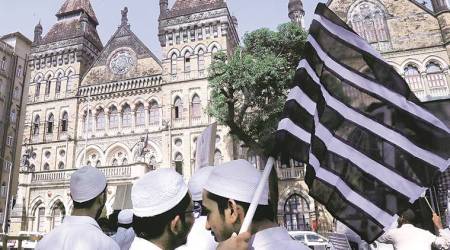 Women celebrate the Supreme Court verdict on triple talaq in Mumbai on Tuesday. Prashant Nadkar
Women celebrate the Supreme Court verdict on triple talaq in Mumbai on Tuesday. Prashant Nadkar
While the petitioners were happy with the setting aside of instant triple talaq, the Muslim clergy took comfort in the safeguarding of personal laws, but certain issues in the three judgments appeared as grey areas. “We have also come to the conclusion that the practice being a component of ‘personal law’ has the protection of Article 25 of the Constitution,” read the minority judgment by Chief Justice of India J S Khehar and Justice Abdul Nazeer.
However, the injunction to suspend the “practice” despite admitted protection of fundamental rights under Article 25 of the Constitution for a period of six months had one lawyer-politician asking how it could be suspended if it was indeed recognised as a fundamental right. Justice Kurian Joseph in his judgment expressed “serious doubts” over the injunction of a fundamental right.
“Till such time as legislation in the matter is considered, we are satisfied in injuncting Muslim husbands from pronouncing ‘talaq-e-biddat’ as a means for severing their matrimonial relationship. The instant injunction, shall in the first instance, be operative for a period of six months,” read the minority judgment.
Likewise, the majority judgment of Justice Rohinton Nariman and Justice U U Lalit, which got support from Justice Joseph, who wrote a separate judgment, also got many ruling party members wondering about its long-term import. “It is at this point that it is necessary to see whether a fundamental right has been violated by the 1937 Act insofar as it seeks to enforce Triple Talaq as a rule of Law in the Courts in India,” read the judgment by Justice Nariman and Justice Lalit. Their judgment goes on to conclude that it falls foul of the fundamental right to equality enshrined in Article 14 of the Constitution.
“In our opinion, therefore, the 1937 Act, insofar as it seeks to recognise and enforce Triple Talaq, is within the meaning of the expression ‘laws in force’ in Article 13(1) and must be struck down as being void to the extent that it recognises and enforces Triple Talaq,” read the judgment, declaring “Section 2 of the 1937 Act” to be void on “narrower ground” of being “arbitrary”.
However, the entire mechanism of talaq derives its sanctity from the same Section 2 of the 1937 Act (popularly known as Shariat Act). Lawyers active in politics wondered whether the setting aside of instant talaq (talaq-e-biddat) would opne up other forms of talaq (talaq-e-hasan or talaq-e-ahsan) for challenge. Though Justice Joseph’s argument has agreed and disagreed in parts with the two other judgments of his fellow judges, his judgment relies heavily on the theological interpretation of whether the practice under Shariat fits under the tenets of the Quran.
“After the introduction of the 1937 Act, no practice against the tenets of Quran is permissible,” wrote Justice Joseph, relying upon the theological Suras of Quran — Sura-II, Sura-IV and Sura-LXV — to conclude that “triple talaq is against the basic tenets of the Holy Quran and consequently, it violates Shariat”.
“What is held to be bad in the Holy Quran cannot be good in Shariat and, in that sense, what is bad in theology is bad in law as well,” concluded Justice Joseph’s judgment, prompting many to ask how it fit into the constitutional principles.

